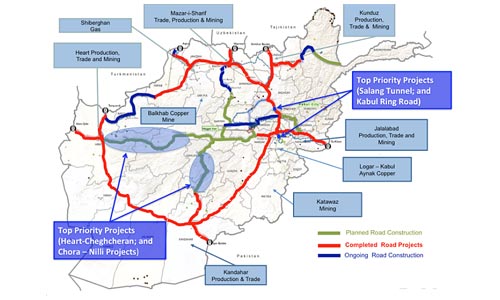Seeking to regain its historical position as the regional transit hub, Kabul government has put its weight behind regional connectivity and increased the trade volume between Afghanistan and regional countries in recent years through launching air corridors with India, Turkey, Kazakhstan, Saudi Arabia, Indonesia, and China.
In early November, Afghan President Muhammad Ashraf Ghani opened Afghanistan-China Air Corridor to increase the volume of export to China in a bid to address the trade deficit. In the inauguration ceremony, President Ghani described pine nuts and pistachio nuts as “the hidden treasures” of Afghanistan adding that the trade corridor would enable the country to utilize its full potential.
Besides friendly neighbors, China and Afghanistan are significant trading partners. With Chinese opening-up policy, the room for trade has widened in China for all countries, including Afghanistan, whose businessmen and high-level officials are taking active part in Chinese economic forums, expos and exhibitions. For example, Afghan high-level officials, led by second deputy CEO Muhammad Muhaqqiq, participated in the fifth China-South Asia (CSA) Expo in Kunming, capital of Southwest China’s Yunnan province, on June 14. Likewise, second vice president Sarwar Danesh attended the International Cultural Expo of the Silk Road in Chinese Province of Gansu – also known as the sister city of Bamyan – in late September. More Significantly, President Ghani also had a trip to China last year to attend Shanghai Cooperation Organization.
In the meantime, a number of Afghan businessmen attended many expos, forums and exhibitions – including CSA Expo and China International Import Expo (CIIE) – in China. Attending the CIIE in Shanghai, Director of the Afghan Expo Commission Omer Rahimy, said Afghan government subsidized businessmen to export their goods through Afghanistan-China Air Corridor, which made shipping goods to China more affordable. He featured Afghanistan’s handicrafts, carpets, precious stones, saffron, pine nuts, etc. in the exhibition.
Moreover, Afghanistan launched lapis lazuli route, an air corridor with Turkey, on December 13, which enables Afghanistan to transport its products to Turkey as well as to Europe. “We are a people of connection and not a people of disconnection. We do not want isolation and separation, we want communication and cooperation,” Ghani is cited as saying.
Kabul also hosted the first coordination meeting of RECCA (Regional Economic Cooperation Conference on Afghanistan) Ambassadors in 2019 and the inauguration of RECCA Research and Evaluation Center on Sunday. RECCA, which was established in 2005, involves in regional issues such as regional connectivity, trade and transit facilitation, transportation, and multilateral cooperation between member states.
It is self-evident that upgrading economy, strengthening trade and transit, and enhancing import and export with regional countries will make great contribution to poverty alleviation in Afghanistan. The country needs to address trade deficit and boost connectivity with its neighboring countries and beyond through air and land to give the economy momentum. In the current globalized world, transportation construction is an essential prerequisite for economic development. A Chinese proverb says, “If you want to be rich, you must build roads at first”. This saying stresses the significance of transportation and connectivity.
As the “center of Asian crossroads”, Afghanistan should seek to revitalize its historical status through expanding trade and transit with the region and paving the ground for domestic and foreign investment. It is believed that if Afghanistan focuses on economic activities, it will regain its status for three main reasons: First, Afghanistan is known as “the heart of Asia” for its unique geographical location, which is able to connect South Asia to Central Asia and East Asia to West Asia. Second, Afghanistan has huge untapped deposits and mineral resources, which will enable the country to stand on its own feet economically. Third, Afghanistan has huge human capital. The abundant workforce without labor market will necessarily lead the country to poverty. Hence, if Afghanistan struggles to manage its resources, capitalize on its geographical location and use its human capital appropriately, it will regain its former status as “Asian transit and trade roundabout”.
It is believed that Ghani’s administration has played key role in economic activities despite the ongoing instability hampering the economic development. Although terrorist networks and their backers seek to isolate Afghanistan and create obstacles before its economic growth through staging intensified attacks, mining its resources illegally, and smuggling its natural reserves, Afghanistan has made considerable strides in terms of trade.
Nonetheless, the high level of poverty and unemployment suggest that Afghanistan has long way to go. That is, government has much to do to move Afghanistan towards self-reliance. Despite all the struggles made to connect Afghanistan to regional countries and boost its trade and economy, the country is still in its early stage and needs to move on at a faster pace.
Home » Opinion » Afghanistan Makes Strides in Regional Connectivity
Afghanistan Makes Strides in Regional Connectivity
| Hujjatullah Zia

